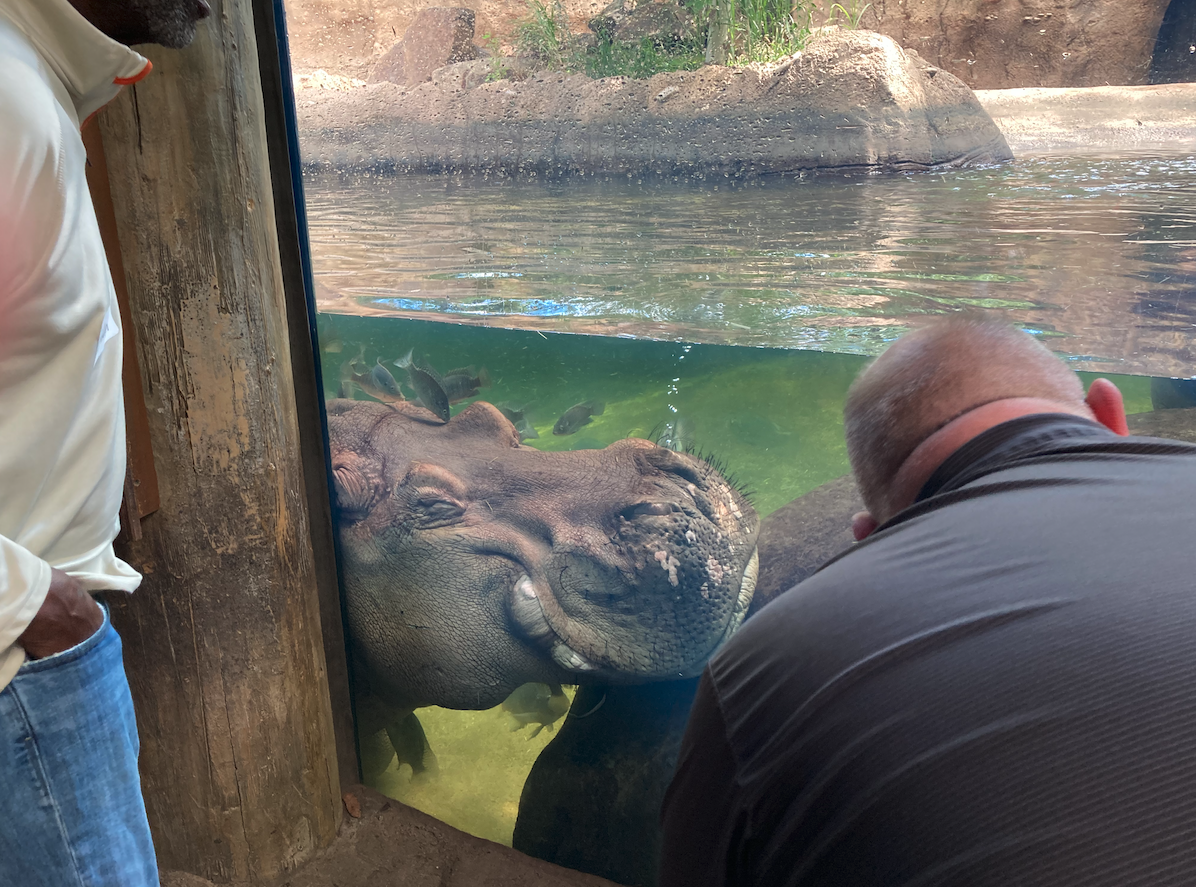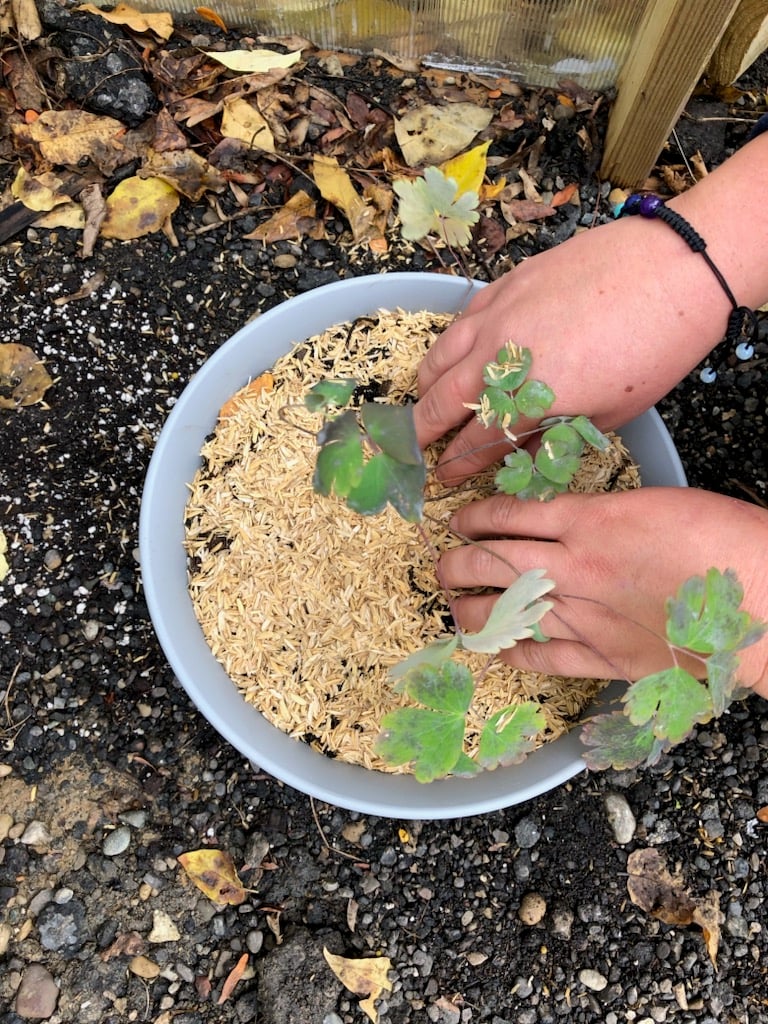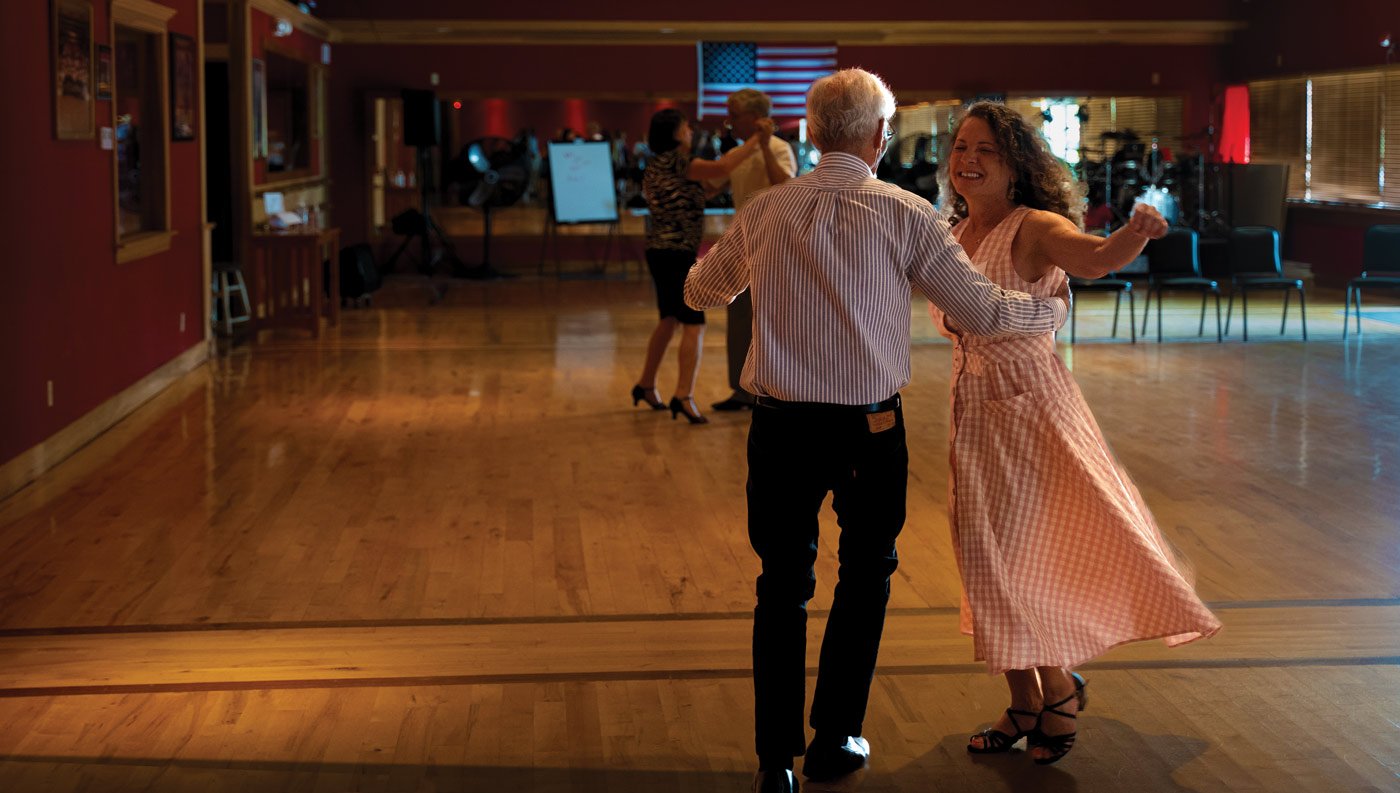
Photo above: The zoo provides fun for all ages. ERS' Center for Memory Support and Inclusion has trained volunteers and staff at the Cincinnati Zoo to be dementia-inclusive.
Not everybody is comfortable getting together with someone who is living with Alzheimer’s disease or another form of dementia. That’s partly because it can be uncomfortable not knowing what to expect when spending time with them. For some people, that concern can be increased when the person is from a different generation.
So, what are some things you can do together? We have more than 65 ideas for you, your family and friends. Please take these merely as suggestions that are intended to offer ideas for what you and your loved one or friend may enjoy.
Ideas of many kinds
One way to make something more interesting is if it’s a “purposeful activity,” says Shannon Braun, director of Episcopal Retirement Services’ Center for Memory Support and Inclusion (CMSI). Shannon organizes and supports programs that help people living with different levels of dementia and their care partners to break out of their daily routines to do stress-free activities together.
Some of those programs include visiting the Cincinnati Art Museum, Contemporary Arts Center, Taft Museum of Art, American Sign Museum, the Cincinnati Zoo, Civic Garden Center of Greater Cincinnati, and even taking simple dance lessons at A-Marika Dance Company in Sharonville. A link to the CMSI website, which lists these programs, support-group options and more, is here.
One such purposeful activity was mentioned during a recent ‘Nurturing Minds’ program at the Civic Garden Center.
Mary Dudley of the center suggested one helpful thing people can do that matters and makes a difference is planting a pollinator garden, and later counting the numbers of pollinators visiting those plants, to help naturalists learn what parts of the community may be better for certain pollinator plants.
Here's how to do it: Find a comfortable place to sit, where you can see flowers in bloom. You can sit indoors, in front of a window, or outside on a patio, or even in a park or the woods. Bring a pencil and notebook with you to record how many insects you see visiting the flowers you are observing. Other things to record in your notebook include the date, weather patterns, the type of flower or flowers you are observing, and notes about the location where you are making the observations. Many of these insects can be pollinators, and they may be using the flower nectar as a food source.
Mary explained how this helps: "Recording data on pollinator visits and bloom times is an important set of information that scientific researchers can use to understand more about the natural world and changes in our ecosystems."
People in Greater Cincinnati can email their data to her at mdudley@civicgardencenter.org .
So together, your activity can be a gift that keeps on giving, to both nature, and the two of you.
“Purposeful activity I think is the key,” Shannon said.
And another thing: “I think having a list of options takes a little stress off of the care partner. Rather than feeling pressured to come up with something to do, you are going down a list and choosing something you can try together,” Shannon said.
These are merely suggestions, made more specific to spark ideas you may have for things that may be even more fun for you and your loved one. Feel very free to change any of the suggestions, but keep in mind: You don’t want to make things too complicated, too stressful, or be doing things in a noisy place that is distracting for your loved one.

Photo above: The Nurturing Minds program ERS' Center for Memory Support and Inclusion has created with the Civic Garden Center of Greater Cincinnati teaches people living with dementia and their care partners about plants and trees, and then lets them get their hands dirty.
Have fun! Here are the 65+ suggestions:
Together time
- Take photographs of each other, some serious, some silly. Maybe even try to make a really nice portrait of each other. Talk about them, and what you enjoy about the various shots. If you really like some, have them printed, and share them with family. Consider making a collage of those photos you took.
- Make a collage of existing photos you have, or from images in magazines or newspapers.
- Give them a manicure or pedicure. Or to feel really special, go together to a spa or very quiet salon where you can sit together and talk while getting those nails done.
- Make a list of things they enjoy, and keep it for later reference, for when you seem to run out of things to discuss.
- Encourage them to talk with you about things they enjoy. Dig unexpectedly deep on the subjects. Ask them why they enjoy those things, and why. Do those things bring back childhood memories? Often people in early stages of dementia have excellent memories of their younger years.
- Gather quality photos of the family, their children or grandkids, and put them on a posterboard or other solid background, with the names of everybody below them, so if they wish, they can look at someone’s picture as they speak with them on the phone.
- Have a very small, quiet potluck with friends, family or neighbors. Quiet and small so the number of people is not overwhelming to your loved one. At the potluck, everybody should wear a nametag so there is no embarrassment in not remembering names.
- Make a video of your loved one talking about their life – things like their childhood, their career, or raising children. What in life are they most proud of? If it would make it more fun for you both, set up a tripod for your phone and pretend you’re both on a talk show.
- Give them a hand massage, using a nice lotion.
- Brush his or her hair.
- If the video of your loved one talking is too complicated, interview them about their life with the recorder on your phone running, so you preserve the sound of your loved one’s voice, and if they approve of it, share it with family members, who probably will learn new things about their loved one.
- Learn something new together. Cooking? Maybe get out a recipe book and bake or cook something you’ve never tried before. Painting? Fishing? Is there anything they’ve always wanted to do or learn but never had the time? Here’s an opportunity.
“Having a list of options takes a little stress off of the care partner. Rather than feeling pressured to come up with something to do, you are going down a list and choosing something you can try together.”
—Shannon Braun, director of ERS' Center for Memory Support and Inclusion.
- Make a video of your loved one talking about their life – things like their childhood, their career, or raising children. What in life are they most proud of? If it would make it more fun for you both, set up a tripod for your phone and pretend you’re both on a talk show.
- Give them a hand massage, using a nice lotion.
- Brush his or her hair.
- If the video of your loved one talking is too complicated, interview them about their life with the recorder on your phone running, so you preserve the sound of your loved one’s voice, and if they approve of it, share it with family members, who probably will learn new things about their loved one.
- Learn something new together. Cooking? Maybe get out a recipe book and bake or cook something you’ve never tried before. Painting? Fishing? Is there anything they’ve always wanted to do or learn but never had the time? Here’s an opportunity.
Doing things outdoors
- Take a walk – with or without dogs. If the dogs will create too much stress, or distractions, leave them behind.
- Speaking of walking, there’s always the Walk to End Alzheimer’s, which happens each October.
- Go to the park and just relax, and chat.
- Visit the zoo and see some of your favorite animals. Take your time, and enjoy. Episcopal Retirement Services’ Center for Memory Support and Inclusion has a program called Wild About Minds, where people who have dementia and their care partners enjoy a pleasant day at the Cincinnati Zoo as a group, accompanies by zoo staff and with people who the center has trained to better communicate with people who have dementia. Click here to visit the Center’s page.
- Plant flowers.
- Feed the birds.
- Plant a tree, and as you do so, speculate how tall it will be, and what it will look like. Will it provide lots of shade? Has your loved one planted many trees in the past? What was that like for them?
- Water plants together.
- Visit a local airport – big or small – and watch airplanes and jets take off and land. Maybe bring popcorn and soft drinks to add to the experience.
- Rake leaves, if that’s enjoyable for you both.

- Watch dogs in a dog park? What was your loved one’s favorite all-time pet?
- Play cornhole or horseshoes.
- Play catch, or kick a soccer ball back and forth.
- Visit a local swimming pool or beach. If there’s a snack bar there, we recommend checking out the ‘Walking Tacos’ if they have them.
- Visit a forest preserve. Some of them have interesting exhibits about nature, and there are always hiking trails.
- In the fall, visit an orchard. From May to about July in the Midwest, there are farms that let you visit and pick strawberries.
- Have a picnic somewhere on your lawn. Or in a park.
- Take photos together of nature’s beauty, or something else.
- Go out on the deck or patio and enjoy whatever hot or cold beverages you enjoy. After all, it’s a good thing in life to take time to sip the lemonade, or limeade, and just relax.
- Visit a farmer’s market, and then eat some of the food you buy together.
 Photo above: Dancing to Remember is a free program ERS' Center for Memory Support and Inclusion offers in Cincinnati with A-markia Dance Company and the Giving Voice Foundation.
Photo above: Dancing to Remember is a free program ERS' Center for Memory Support and Inclusion offers in Cincinnati with A-markia Dance Company and the Giving Voice Foundation.Indoor things to do
- Listen to your loved one’s favorite music. What do they enjoy about it? What memories does the music evoke for them? Do they have special music memories connected with the love of their life?
- Look through family photo albums. If your loved one can’t remember specific trips, people or places, be careful not to quiz them or inadvertently embarrass them by asking things such as, “You don’t remember that?” Even if they don’t remember events, you can talk about the photos as if they’re interesting pictures that involved someone else. For example, “Look at that beautiful castle.”
- Prepare an elegant afternoon tea together.
- Visit your local branch of the public library.
- Watch your favorite sports team on TV.
- Visit the symphony, ballet, or opera.
- Turn on some music and have a disco party! Or participate in a program that teaches people with dementia and their caregivers easy dance steps in a stress-free way, such as this one in Greater Cincinnati.
- Play with Play-Doh.
- Create sculptures using toothpicks and liquid Elmer’s glue. How high can you make your toothpicks extend toward the sky? There’s an art and engineering to it! Just have fun with it (Pro tip: It’s helpful to wait a few seconds or minutes to let the glue dry below before adding a higher level.)
- Play a card game.
- Look at photos of the presidents, and talk about which ones were your favorite, and why. It’s a good way to learn what your loved one was doing during presidencies of their younger years.
- Look at books of photography or art books that show various paintings. Which do you love? Dislike?
- Put together a puzzle together.
- Play tic-tac-toe.
- Read from one of their favorite books. How about some fun poetry, such as The Raven? Or another favorite of theirs?
- Watch a favorite movie or television show, and discuss afterward.
- Play checkers.
- Visit some of their favorite restaurants.
- Ask them about their childhood, their first car, what it was like to date in their early years. What pets did they have? Did they enjoy school? What was their all-time favorite job, and why? Was there ever a job they didn’t like? What about their entire career made them most proud?
- Volunteer on some worthwhile project together.
- Pick up trash along a roadside—but only if you can do so safely, of course.
- What were their favorite vacations, and where were they?
- Make them their favorite lunch, dinner or snack.

Photo above: Viewing Christmas lights together, or putting some up, can be excellent bonding time, and can evoke memories of holidays past.
Activities for the holidays
- Carve a pumpkin together, or make a pumpkin pie.
- Decorate a Christmas tree.
- Make your own holiday greeting cards, or write notes to other people together inside purchased cards.
- Listen to some of your favorite holiday music. Discuss.
- Watch a favorite holiday film together.
- Drive around with holiday music playing and look at the lights.
- Bake other holiday desserts.
- Play piano or guitar and sing holiday songs.
- Color Easter eggs together.

Listening to favorite music of your loved one or friend can be joyful, especially if it gives the two of you the opportunity to talk about memories the music evokes for them.
Most IMPORTANT of all!
The most important thing of all to remember is it doesn’t really matter how well you do things while you’re doing them. The main point is to spend quality time together, learning things about your loved one’s life story that you might not otherwise ever hear. Keep it stress-free: If something isn’t working, you can also try a Plan B, or Plan C. Seek things they enjoy, and as you find them, delight in the time you’re spending together and enjoy creating new fun times with each other.
Here's one final suggestion:
- Try whatever seems fun to the two of you in the moment. Don’t be afraid to be silly, overly fun, and don’t worry about smiling too much.
Looking for Memory Care for a loved one? We have hiqh-quality nursing homes in both Cincinnati and Louisville.
To contact our Marjorie P. Lee retirement community in Cincinnati's Hyde Park neighborhood, click here....
To set up a tour and dementia assessment at Episcopal Church Home retirement community in Louisville's Graymoor-Devondale neighborhood...
Contact Gry Seymour at 502-396-8987 or gseymour@ERSlife.org. She also is the person to contact when interested in tours of ECH Personal Care (Assisted Living), Skilled Nursing, or Memory Support.












